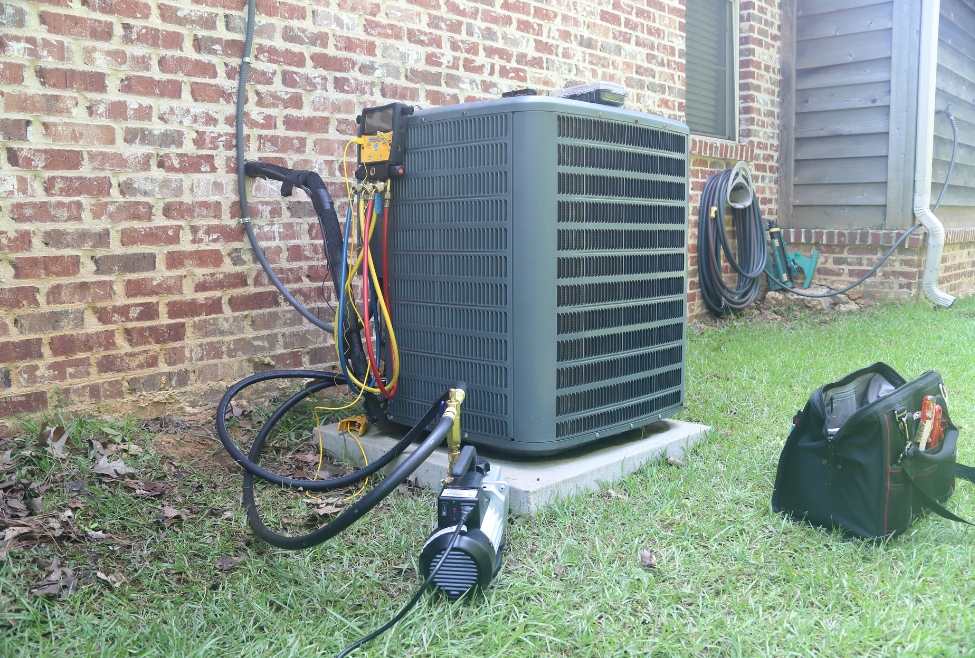
Understanding Why Your Air Conditioner Is Leaking
When your air conditioner starts leaking, it’s more than just a puddle on the floor — it’s a sign that something’s wrong with your cooling system. Whether it’s a clogged drain line or frozen coils, catching the problem early can help you avoid costly water damage and major repairs. If you’ve found yourself searching how do I stop my AC unit from leaking, you’re in the right place.
At Family Heating and Cooling, we help homeowners in New Bedford, Fall River, Taunton, Dartmouth, Somerset, and Fairhaven keep their homes cool and dry all summer long. Let’s walk through some common causes of AC leaks and how to fix them.
Common Reasons Your AC Is Leaking
1. Clogged Condensate Drain Line
When dirt, dust, or algae builds up in your condensate drain line, water can back up into your home. If your AC is leaking water inside the house, this is one of the most common causes. A professional HVAC tune-up can help flush the line and prevent future clogs.
2. Dirty or Clogged Air Filter
A clogged filter restricts airflow and can cause your evaporator coil to freeze. When it thaws, it may overflow the drain pan, leading to a leak. Changing your air filter every 1–2 months is a simple way to prevent this.
3. Rusted or Damaged Drain Pan
Older air conditioners often develop cracks or rust in the drain pan. Once damaged, the pan can’t hold the condensation properly, causing water to leak out of the system. Replacing the drain pan is a straightforward repair that can prevent further damage.
4. Low Refrigerant
Low refrigerant can lead to frozen coils, which then melt and overflow. If you hear hissing sounds or notice your home isn’t cooling properly, you may have a refrigerant leak that needs immediate attention.
How to Stop Your AC from Leaking
If you’re wondering how do I stop my AC unit from leaking, start by scheduling regular maintenance. Preventative AC tune-ups include cleaning the coils, flushing the drain line, checking refrigerant levels, and inspecting key parts of the system. You can learn more about what’s included in a professional AC tune-up.
In some cases, leaking could be a sign your system is reaching the end of its lifespan. If repairs are frequent and costly, a full AC replacement might be the most cost-effective long-term solution.
When to Call the Pros
Don’t wait for a small leak to turn into a major headache. If your AC is leaking water or showing other signs of failure — like inconsistent cooling, musty smells, or high humidity — our AC repair team is ready to help. We respond quickly, diagnose the issue accurately, and fix it right the first time.
Proudly Serving
Keep Your Home Comfortable and Dry
If you’re dealing with a leaking air conditioner, we’ve got you covered. Contact Family Heating and Cooling today to schedule your AC inspection or repair and restore comfort to your home.
FAQs
How can I get my AC to stop leaking water?
If your AC is leaking water, start by checking the air filter—clogged filters can block airflow and cause ice buildup that melts and leaks. Also, inspect the drain pan for cracks and make sure the condensate drain line isn’t clogged. If these issues aren’t the cause, the unit may have a refrigerant leak or damaged components that require professional AC repair.
How do you fix a leaking air conditioner?
Fixing a leaking AC involves identifying the source of the leak. Common fixes include replacing a cracked drain pan, flushing a clogged condensate drain line, cleaning or replacing the air filter, and repairing frozen evaporator coils. A certified HVAC technician can diagnose the problem quickly and make the necessary repairs to prevent water damage and restore your AC’s efficiency.
Can I still use my AC if it’s leaking water?
Running an air conditioner that’s leaking water isn’t recommended. Continued use can cause further damage to internal components and may lead to mold, electrical issues, or water damage in your home. It’s best to shut off the unit and schedule an inspection to avoid costly repairs.
Which is the main reason for water leakage in AC?
The most common cause of water leakage is a clogged condensate drain line. When this line gets blocked with debris, dirt, or algae, condensation from your AC can’t drain properly and ends up leaking out of the unit. Dirty air filters, low refrigerant levels, or a broken drain pan can also be contributing factors.
Will turning off AC stop it from leaking water?
Turning off your AC may temporarily stop the visible water leakage, especially if it’s caused by ice melting off the evaporator coils. However, it won’t resolve the underlying issue. A leak usually points to a problem that needs maintenance or repair to prevent it from recurring.
Need expert help? Contact Family Heating and Cooling for fast, reliable AC repair and leak prevention service you can trust.






